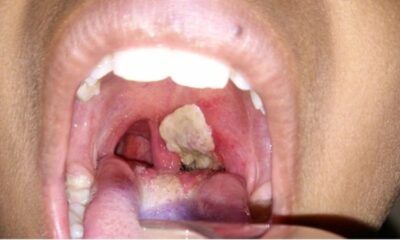Health
Cholera kills 816 in 23 states, says NCDC report

Cholera has killed a total of 816 people across the country since its outbreak this year, the Nigeria Centre for Disease Control has said.
About 31,425 people are suspected infected across 22 states and the federal capital territory and 311 have been confirmed, according to a situation report the NCDC released on Monday.
“Between the 1st of January and 1st of August 2021, 31,425 suspected cases of cholera, 311 confirmed cases and 816 deaths have been reported from 22 states and FCT,” the report said.
The report gave the affected states as Benue, Delta, Zamfara, Gombe, Bayelsa, Kogi, Sokoto, Bauchi and Kano.
Others are Kaduna, Plateau, Kebbi, Cross River, Niger, Nasarawa, Jigawa, Yobe, Kwara, Enugu, Adamawa, Katsina, Borno and FCT.
The NCDC said the National Cholera Emergency Operations Centre was activated on the 22nd of June 2021 following an increase in the number of cholera cases.
While saying that a reactive oral cholera vaccine (OCV) campaign led by the National Primary Healthcare Development Agency (NPHCDA) was conducted in Bauchi local government area, Bauchi State in July , it added that none of these medical interventions will solve the underlying issues leading to cholera outbreaks.
The centre said cholera is a waterborne disease, and the risk of transmission is higher when there is poor sanitation and disruption of clean water supply.
“The wrong disposal of refuse and practices such as open defecation endanger the safety of water used for drinking and personal use. These lead to the spread of water-borne diseases such as cholera.
“Without proper water, sanitation, and hygiene, Nigeria remains at risk of cholera cases and deaths.
“The long-term solution for cholera control lies in access to safe drinking water, maintenance of proper sanitation and hygiene. “We continue to advocate to state governments to prioritise action for solutions that ensure access to and use of safe water, basic sanitation and good hygiene practices in communities,” it said.
Cholera is an acute diarrhoeal disease caused by a bacteria called Vibrio cholera. It is a potentially life-threatening, and primarily a water-borne disease.
Symptoms of the disease include nausea and vomiting , dehydration which can lead to shock, kidney injury and sudden death , passage of profuse pale and milky, watery stool (rice water coloured), and body weakness.
The NCDC urged Nigerians to keep their environments clean, only drink or use water that is boiled and stored safely, ensure food is cooked and stored in a clean and safe environment, avoid open defecation and also wash their hands regularly with soap and running water.
It also advised people to visit a health facility immediately, if they have sudden onset of profuse watery diarrhoea, nausea, vomiting, and weakness.
Health
NUFBTE Workers Occupy NAFDAC Lagos Office Over Sachet Alcohol Ban

NUFBTE Workers Occupy NAFDAC Lagos Office Over Sachet Alcohol Ban
Members of the National Union of Food, Beverage and Tobacco Employees (NUFBTE) on Thursday staged a protest at the NAFDAC office in Isolo, Lagos, demanding the reversal of the agency’s ban on sachet and PET-bottled alcoholic beverages. The union claims the ban contradicts a directive reportedly issued by the Federal Government, and they want production lines that were sealed to be immediately reopened.
The protesters, including manufacturers, distributors, and industry workers, argued that the enforcement of the ban threatens jobs, livelihoods, and the operations of small and medium-sized enterprises that rely on sachet alcohol sales. During the demonstration, union members handed a petition to NAFDAC officials, urging dialogue and a more balanced approach that safeguards both public health and the food and beverage sector.
NUFBTE cited alleged instructions from the Office of the Secretary to the Government of the Federation and the Office of the National Security Adviser, claiming that NAFDAC should suspend enforcement. The union said continued closure of production lines and restriction of alcohol sales would lead to economic hardship and widespread job losses.
READ ALSO:
- Naira Could Trade Below ₦1,000/$ With Dangote Refinery at Full Capacity — Otedola
- Adeyanju Urges EFCC, DSS to Probe El-Rufai Over Alleged Corruption, Insecurity in Kaduna
- Granite-Laden Truck Kills Motorist, Leaves Wife Critically Injured in Lekki–Ajah Crash
However, NAFDAC rejected the claims, with Director-General Prof. Mojisola Adeyeye stating that no federal directive has instructed the agency to halt the ban. In a statement, the regulator described circulating reports as “false” and “misleading,” emphasizing that its actions are within statutory authority and in line with official government policies.
“NAFDAC has not received any formal directive to suspend its regulatory or enforcement activities concerning sachet alcohol,” the statement read. The agency reiterated its commitment to public health protection, regulatory compliance, and consumer safety, warning the public and industry stakeholders to rely on verified information from official channels.
The ban, implemented earlier this month, targets alcoholic beverages packaged in sachets and containers smaller than 200ml, a measure aimed at reducing unregulated alcohol consumption and protecting vulnerable groups. While the policy has faced backlash from workers and businesses, NAFDAC maintains that it is necessary for national health and safety.
The protest underscores the tension between regulatory enforcement and economic concerns, as workers continue to call for inclusive policymaking and engagement with industry stakeholders to mitigate the impact on jobs and local businesses.
NUFBTE Workers Occupy NAFDAC Lagos Office Over Sachet Alcohol Ban
Health
NAFDAC Clarifies: No Government Directive to Halt Sachet Alcohol Enforcement

NAFDAC Clarifies: No Government Directive to Halt Sachet Alcohol Enforcement
The National Agency for Food and Drug Administration and Control (NAFDAC) has dismissed reports claiming that the Federal Government ordered a suspension of its enforcement activities against sachet alcohol and 200ml PET bottle alcoholic beverages, describing the reports as “false and misleading.”
In a statement signed by its Director-General, Prof. Mojisola Adeyeye, the agency clarified that it has not received any formal communication from the Federal Government instructing it to halt regulatory or enforcement operations. NAFDAC stressed that all its actions are carried out within its statutory mandate and guided by existing laws and official government directives.
“The said publication is false, misleading, and does not reflect any official communication received by the Agency from the Federal Government,” the statement read. Prof. Adeyeye reiterated that enforcement of regulations on sachet alcohol remains active and any changes to national regulatory policies would be officially communicated through authorised channels.
READ ALSO:
- Suspected IED Explosion Rocks Bayelsa Secretariat, Police Arrest Suspect
- Regina Daniels Shares Emotional Message on Children’s Welfare Amid Custody Battle
- Electricity Workers Serve 21-Day Nationwide Strike Notice to FG
NAFDAC warned that the spread of unverified information can cause public confusion, economic uncertainty, and misinterpretation of government policy. The agency urged the public, industry stakeholders, and the media to rely only on verified information released via its official platforms and government communication channels.
The clarification comes amid ongoing concerns over the public health risks of sachet alcohol, which has been associated with poisoning incidents and misuse, particularly among young people. NAFDAC reiterated its commitment to protecting public health, ensuring compliance in the food and beverage sector, and maintaining national interest while carrying out its regulatory duties.
The agency’s statement underscores that all enforcement operations targeting unsafe alcohol products will continue without interruption, aiming to safeguard consumers and uphold public safety.
NAFDAC Clarifies: No Government Directive to Halt Sachet Alcohol Enforcement
Health
FG Ends ‘No Work, No Pay’, Clears January Salaries After 84-Day JOHESU Strike

FG Ends ‘No Work, No Pay’, Clears January Salaries After 84-Day JOHESU Strike
The Federal Government has officially lifted the “No Work, No Pay” directive imposed during the 84-day nationwide strike by the Joint Health Sector Unions (JOHESU) and approved the immediate payment of January 2026 salaries for all affected health workers.
The decision followed the suspension of the industrial action after a successful conciliation meeting between the Federal Government and JOHESU leadership, prompting the union to direct its members nationwide to resume work in the interest of patients, health system stability, and national public health security.
In a statement issued by the Assistant Director, Press and Public Relations of the Federal Ministry of Health and Social Welfare, Ado Bako, the Minister of State for Health, Dr. Iziaq Adekunle Salako, said the resolution reflects the government’s commitment to dialogue, fairness, and the protection of Nigeria’s health workforce.
READ ALSO:
- Former NAHCON Chief Explains Why He Stepped Down, Denies Conflicts
- Fubara Reaffirms Commitment to Wike’s Vision
- Housing Crisis: ₦1.5m Rent vs ₦70k Minimum Wage Sparks Outcry in Nigeria
“The Federal Government remains fully committed to the welfare, dignity, and professional advancement of all health workers across Nigeria. This resolution demonstrates that dialogue, mutual respect, and good faith remain the most effective tools for resolving industrial disputes in our health sector,” Salako said.
The minister acknowledged the sacrifices made by health workers during the prolonged strike and assured JOHESU members that no worker would be victimised, sanctioned, or intimidated for participating in the action.
“Government has therefore approved the immediate payment of January 2026 salaries and assures all JOHESU members that no reprisal will follow the industrial action,” he added.
Salako further reaffirmed the administration’s commitment to sustained engagement with health sector unions, noting that discussions would continue on the Collective Bargaining Agreement (CBA) and outstanding issues relating to the adjustment of the Consolidated Health Salary Structure (CONHESS).
He disclosed that the Federal Government has committed to making provisions for the proposed salary adjustments in the 2026 Appropriation Act, in line with the recommendations of the existing technical committee template.
“The inclusion of salary adjustment provisions in the 2026 budget framework reflects our seriousness about achieving sustainable solutions for the health workforce through concrete policy and budgetary actions,” the minister stated.
He commended the spirit of cooperation and patriotism displayed by all parties throughout the negotiation process and reassured Nigerians of the government’s commitment to uninterrupted, quality, and accessible healthcare services nationwide.
FG Ends ‘No Work, No Pay’, Clears January Salaries After 84-Day JOHESU Strike
-

 metro3 days ago
metro3 days agoIKEDC Sets Feb 20 Deadline for Customers to Submit Valid IDs or Face Disconnection
-

 Education3 days ago
Education3 days agoSupreme Court Affirms Muslim Students’ Right to Worship at Rivers State University
-

 News2 days ago
News2 days agoAso Rock Goes Solar as Tinubu Orders National Grid Disconnection
-

 metro2 days ago
metro2 days agoLagos Police Launch Manhunt for Suspect in Brutal Ajah Murder
-

 Business3 days ago
Business3 days agoNaira Could Trade Below ₦1,000/$ With Dangote Refinery at Full Capacity — Otedola
-

 metro3 days ago
metro3 days agoArmy University Professor Dies in Boko Haram Captivity After Nearly One Year
-

 International3 days ago
International3 days agoTrump Halts Minnesota Immigration Crackdown After Fatal Shootings, Protests
-

 Sports2 days ago
Sports2 days agoLookman Shines as Atlético Madrid Hammer Barcelona 4-0













